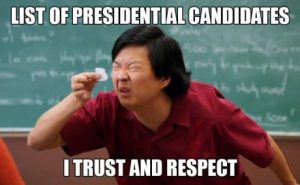 The true soldier fights not because he hates what is in front of him but because he loves what is behind him. –GK Chesterton
The true soldier fights not because he hates what is in front of him but because he loves what is behind him. –GK Chesterton
I haven’t written about politics lately, outside of quips comprised of one hundred forty characters or less. This was not always the case; if you travel back in time through my Facebook feed (PLEASE DON’T), you’ll see that I wasn’t always so taciturn come election year. I ranted and railed with the best of them, my updates staunch and standoffish and no doubt offensive to those on the other side of the fence from the one I occupied. I marvel that I have any friends left, on social media or in real life, and can only give thanks for the graciousness they displayed in sticking around through my tirades (and keeping their responses, for the most part, to themselves or behind my back).
My motivation for shouting political rhetoric from the (online) rooftops was simple: I clung to politics as a facet of my identity. I needed to proclaim my particular values, grounded as I believed they were in faith but upheld by political party affiliation, to project a sense of self into the world. I saw it as a sign of strength that I fought so publicly for what I held dear–and I valued strength because I didn’t see that weakness and failure are valid parts of any narrative rooted in grace, for it’s grace that answers weakness and failure–not strength–with redemption.
I’m so tired of politics. But I’m so not tired of grace.
For awhile now, an unholy hybrid has been brewing between faith and politics that belies an actual separation between them–a gulf of cognitive dissonance. The opposing trajectories of the two render them never fully reconcilable. At some point, we have to renounce the supremacy of one to acknowledge that of the other. Here are the differences I see.
Politics is a climb through the ranks of power. Grace is a descent down the ladder to be among the “least of these.”
Politics eschews forgiveness as a waste of time and chases revenge as a show of strength. Grace confronts me with my own flawed nature, offers forgiveness in return, and leaves me with no option but to offer it to others.
Politics is cling-wrap for labels that would legitimize its agenda. Grace repels all labels or attempts to categorize it; it shuns predictability; it operates outside cultural and ethnic and racial boundaries created by men and dissolves them.
Politics embraces strategy. It shows up with tools to build a kingdom and sets about creating that kingdom according to the design we see fit. Grace recognizes that the only kingdom worth living in will not be constructed by human hands but ushered in by divine ones apart from all our strategies, for it holds the only blueprint for heaven.
Politics assumes that peace will be created by policy. Grace recognizes that while we are invited to be a part of peace on earth, we will never fulfill it on our own.
Politics seeks to protect self-interest among a sea of selves who have different interests. It is insular and, therefore, creates islands. Grace recognizes that we are held and protected outside of strategy and policy by hands we can’t see, and those hands bind us together with commonalities that outweigh our differences.
Politics burdens us to protect our own freedom. Grace brings freedom wherever it shows up.
Politics rejects any space between what is and what should be. Grace allows us to see that that space undeniably exists, and gives us the freedom to mourn it, to recognize the constant “not yet” of living in this world, to be unafraid of it because we know that completion is coming–and not by our own doing.
Politics is full of bad news that charges people to prepare. Grace is full of good news that frees them to change.
Politics tells me I am a guardian. Grace tells me I am a recipient.
Politics demands unwavering consistency. Grace recognizes that the path of redemption is full of change.
Politics demands an either/or decision, a vote often based in my most palpable fear. Grace sets me free to vote, or not vote, according to my deepest belief.
Politics ennobles the basest emotions–anger, fear–into battle cries. Grace uncovers what lies beneath anger and fear and frees me to face it, knowing my truest safety is never in danger.
Politics puts me in a position to choose between the lesser of two evils. Grace tells me that I and my vote are not the ultimate answer, and points to the one who is.
Politics is temporary. Grace is eternal.
